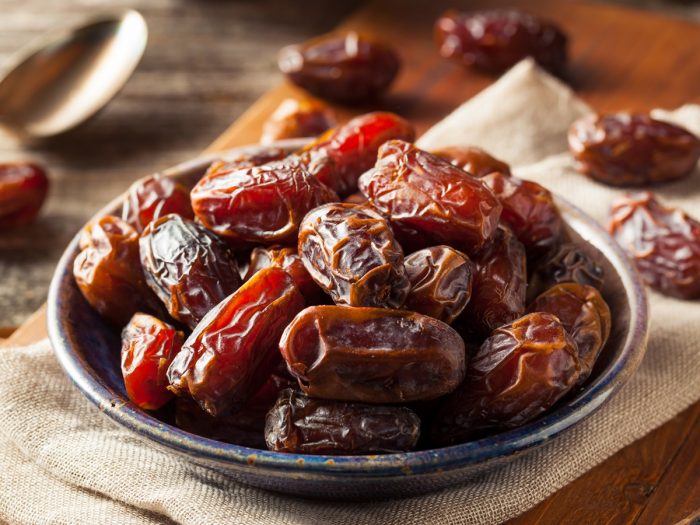Dried dates can be a delicious part of any diet, and they can be used in a surprisingly large number of ways.
What are Dried Dates?
Dried dates should, first and foremost, not be confused with fresh dry dates. Fresh dates typically come in three forms – soft, semi-soft, and dry. Each of these types can be used in various ways and specific culinary instances, but even a dry fresh date has some moisture present. Much of it has been removed to extend the shelf life, but a dried date goes through an even more intensive dehydration process. This gives dried dates a very long shelf life – 12 months or more – depending on the storage conditions. If you freeze-dry dates, they can retain their flavor and nutrient density even longer – up to 5 years! [1]
These dates provide a more concentrated burst of nutrients, as well as a stronger flavor, which is why they are often preferred, and they are relatively easy to find in stores and markets around the world, being a major export of Iran and other Middle Eastern countries.

Dried dates are an excellent source of calcium and fiber. Photo Credit: Shutterstock
Nutrition
Dried dates have a unique nutritional profile, as they are unusually high in calories. Since all of the water has been removed, a single serving of dates represents about 285 calories, twice as many as the same serving volume of fresh dates. That same serving has 5 grams of fiber and about 3 grams of protein. This variety of dates also contain vitamin C and K, calcium, B vitamins, and iron, along with various trace amounts of other minerals and antioxidants. [2]
Benefits
Dried dates benefit the cardiovascular system, prevent chronic diseases, and strengthen the hair. They also can improve the appearance of the skin.
Skin Care
The vitamin C and K found in these dried fruits can help to improve skin quality and appearance, reduce inflammation, and eliminate some signs of aging, such as wrinkles and blemishes. [3]
Heart Health
Potassium is found in good quantities within these dates, which can help lower blood pressure. The high fiber density also lowers overall cholesterol levels and improves heart health. [4]
Aid in Digestion
Dried dates contain both dietary fiber and Beta-D-glucan, both of which can contribute to feelings of satiety and prevent overeating, while also improving nutrient uptake and relieving symptoms of indigestion. [5]
Hair Care
Good levels of iron, calcium, and vitamin C contribute to the healthy production of hair and a reduction in inflammatory conditions that can cause hair loss and dandruff.
Energy Source
These dates are a good source of carbohydrates and these tiny dried fruits can represent a major energy boost at any time of day. [6]
Weight Gain
If you need to bulk up or gain weight quickly, for fitness or recovery reasons, following an injury or illness, eating dates can give you a major calorie boost. [7]
Fresh vs Dried Dates
Fresh dates come in three main varieties, as mentioned earlier, and are not as common as the dried variety. Dried dates are more commonly found in other countries, as they are easier to export and keep fresh. To know more about the different varieties of dates, you can read 9 Types Of Dates You Didn’t Know About.
Dried and fresh dates can be stored in both the refrigerator and the freezer, although the dried variety can keep for far longer. In terms of appearance, the dried form of dates may resemble a large raisin or a long wilted grape; the dehydration process causes this wrinkling of the skin. A fresh date, however, will be a darker, red color and will have fewer wrinkles, appearing plump and firm.
How to Eat Dried Dates?
Many people prefer dried dates over fresh ones as they have a longer shelf life. You can eat these nutrient-rich dates as a healthy snack or just before you go for a run as it offers a sweet energy boost.
You can also add chopped dates to salads, couscous, and into your morning oatmeal. If you want to reconstitute them, soak them in hot water for ten minutes. They will become plump and fleshy. You can add these to sweeten smoothies, cakes, and muffins. For an easy sweet treat, add reconstituted dates to your food processor and make date pulp. You can roll them into small balls and cover with toasted coconut flakes or sesame seeds. Store them in an airtight container and refrigerate. They don’t last as long as they are very addictive!
